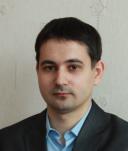|
MAIN PAGE
> Back to contents
Culture and Art
Reference:
Nilogov A.S., Solomonik A.B.
The Philosophy of Semiotic Systems: From the Theory of 'General Semiotics' to the Philosophy of Language/Anti-Language (the Conversation of Aleksey Nilogov with Abraham Solomonick
// Culture and Art.
2015. № 6.
P. 632-646.
DOI: 10.7256/2454-0625.2015.6.16632 URL: https://en.nbpublish.com/library_read_article.php?id=16632
Философия семиотических систем: от теории «общей семиотики» до философии языка/антиязыка (беседа А.С.Нилогова с А.Б.Соломоником)
Nilogov Aleksei Sergeevich
PhD in Philosophy
Current Member (Academician), Moscow Academy of Philosophy of Economy; Chairman of South-Siberian Historical-Genealogical Society (Abakan), Member of Russian Genealogical Federation, Head of Laboratory of Genealogical Research, Khakass Scientific Research Institute of Language, Literature and History
655017, Russia, respublika Khakasiya, g. Abakan, ul. Shchetinkina, 23, kab. 23

|
nilogov1981@yandex.ru
|
|
 |
Other publications by this author
|
|
|
Solomonik Abram Bentsianovich
Doctor of Pedagogy
not provided
9458109, Israel, Jerusalem, str. Hillel, 9

|
semiosol@netvision.net.il
|
|
 |
|
DOI: 10.7256/2454-0625.2015.6.16632
Received:
12-10-2015
Published:
1-5.14285714286-2015
Abstract:
The conversation with Abraham Solomonik has been recorded within the framework of the editorial project 'Who creates philosophy in Russia today' and devoted to the philosophical aspects of semiotics that expand the linguistic turn of the humanities. Abraham Solomonick (born in 1927) is a doctor of pedagogy, expert in teaching foreign languages, lexicographer, philosopher and founder of the original 'general semiotics' (the theory of signs, sign systems and semiotic reality). In 1974 Solomonik moved Israel with his family where he taught Hebrew to repatriates from other countries. After working for the Ministry of Education of Israel for 18 years, he got retired and started to work on semiotics. Since then, he has published over a dozen of articles devoted to semotics both in Russian and English. He lives in Jerusalem. He is the Professor Honoris Causa and a member of the Russian Academy of Information Sciences (Moscow). The following books written by him are published in Russian: 'Language as a Sign System' (Moscow, 1992), 'Philosophy of Sign Systems and the Language' (Minsk, 2002), 'Positive Semiotics' (Minsk, 2004), 'Paradigm of Semiotics' (Minsk, 2006), 'Syntax in Sign Systems' (Minsk 2007), 'Essay on General Semiotics' (Minsk, 2009), 'Semiotics and Knowledge Theory' (Moscow, 2012), 'A Theory of General Semiotics' (Cambridge, 2015). In his conversation Nilogov has used semiotic, hermeneutic, linguistic, comparative historical reserach methods and the method of interview/conversation. Already at the beginning of the last century a Swiss linguist Ferdinand de Saussure stated that language was a system of signs and linguistics should be regarded as other semiotic disciplines, or even seen as the leading branch of semiotics. Ever since then there have been ongoing discussions on the place of language among other sign systems. The theory of general semiotics presented by Abraham Solomonick claims to explain the laws of functioning of all sign systems, from the most primitive (semaphores, for instance) to the most complex systems (language, mathematics, mustic language, etc.). Therefore Solomonick's approach to the place and role of languages in the universe of semiotics is seen by Nilogov as very important, all the more so as Solomonick's approach plays a specific role in a range of never-ending and constantly changing views on this problem.
Keywords:
philosophy of antilanguage, philosophy of semiotics, antilanguage, sign reality, ontological reality, Solomonik, sign system, semiotics, philosophy of language, general semiotics
References
1. Levi-Stross K. Pervobytnoe myshlenie. Per., vstup. st. i prim. A. B. Ostrovskogo. – M., 1994.
2. Kun T. Struktura nauchnykh revolyutsii: Per. s angl. / T. Kun; Sost. V. Yu. Kuznetsov. M., 2003.
3. Riker P. Konflikt interpretatsii. Ocherki o germenevtike / Per. s fr., vstup. st. i komment. I. S. Vdovinoi. – M., 2008.
4. Solomonik A. B. Pereosmyslenie lotmanovskogo ponyatiya «semiosfera» (http://nounivers.narod.ru/pub/as_semi.htm).
5. Nilogov A. S. Filosofiya antiyazyka. – SPb., 2013.
6. http://it-claim.ru/Persons/Solomonick/SolomonickAbraham.htm.
7. Solomonik A. B. Yazyk kak znakovaya sistema. 2-e izd. – M., 2010.
8. Solomonik A. B. Filosofiya znakovykh sistem i yazyk. 3-e izd. – M., 2011
9. Nilogov A.S. Antiyazykovaya nominatsiya bol'shikh chisel (V nachale bylo Chislo, i Chislo bylo u Boga, i Chislo bylo Bog) // Filologiya: nauchnye issledovaniya. - 2013. - 3. - C. 266 - 274. DOI: 10.7256/2305-6177.2013.3.9645.
10. Nilogov A.S. Psikhologiya i filosofiya antiyazyka (na materiale monografii I. A. Beskovoi «Priroda snovidenii») // Psikhologiya i Psikhotekhnika. - 2015. - 6. - C. 588 - 601. DOI: 10.7256/2070-8955.2015.6.15111.
11. Nilogov A.S. Antiyazyk kak yasnovidenie v besslovesnoi kommunikatsii D. G. Benneta
// Psikhologiya i Psikhotekhnika. - 2015. - 1. - C. 92 - 103. DOI: 10.7256/2070-8955.2015.1.13737.
Link to this article
You can simply select and copy link from below text field.
|
|


